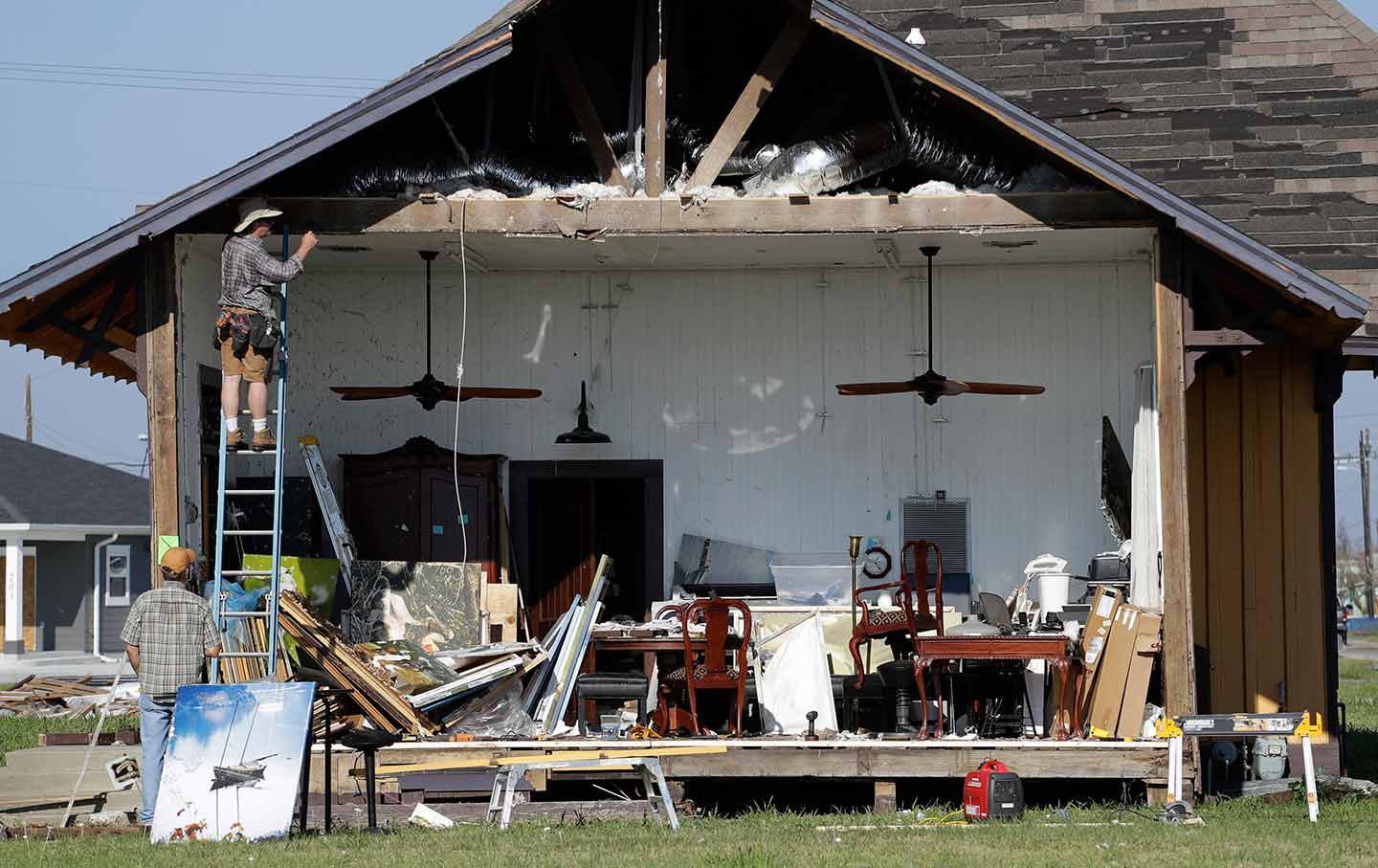
Workers begin to repair a home that was damaged when Hurricane Harvey hit Texas. August 30, 2017. (AP Photo / Eric Gay)
The horrors hurled at Houston and the Himalayan lowlands in late August were heartbreaking—but also infuriating. How many times must we see this disaster movie—titled Hurricane Harvey in 2017, Hurricane Sandy in 2012, and Hurricane Katrina in 2005, along with many lesser- known foreign releases—before we intervene and change the ending? And how long before we hold the ultimate authors of such climate catastrophes accountable for the miseries they inflict?
The tragedy of Harvey starts with the suffering of innocents like Jordyn Grace, the 3-year-old who survived the flood by clinging to the body of her drowned mother, who had prayed with her last breaths. At least 60 people died in Texas because of the storm, over 1 million people were displaced, and who knows how many survived but lost everything? Multiply the death and destruction in Texas a hundredfold to comprehend the scale of devastation in India, Nepal, and Bangladesh, where—although the news coverage has been a fraction of Harvey’s—a staggering 16 million children “are in urgent need of life-saving support” after “torrential monsoon rains and catastrophic flooding,” UNICEF reports.
What makes this so infuriating is that it shouldn’t be happening. Experts have warned for decades that global warming would increase these sorts of weather extremes and that people would suffer and die if protective measures were not implemented. In 2008, John Podesta, soon to be Obama’s transition director, organized a war game to test the responses to projected climate disruptions. Eerily enough, the scenario chosen—and vetted as scientifically accurate by the Oak Ridge National Laboratory—envisioned a Category 4 hurricane striking Houston and extreme monsoons flooding India. This is not to say that global warming “caused” Harvey—a scientifically illiterate framing of the issue—but it did make the rains bigger, more intense, and more destructive. Harvey dumped 27 trillion gallons of water—“enough to cover all of Manhattan a mile deep,” noted Seth Borenstein of the Associated Press—and as much as 30 percent of it can be attributed to global warming, according to Kevin Trenberth, a senior scientist with the National Center for Atmospheric Research.
Many other experts have issued warnings, starting with NASA scientist James Hansen’s landmark 1988 Senate testimony that global warming had begun and, if left unchecked, would threaten the future of human civilization. Recent years have also brought abundant evidence that shifting to wind power, less meat-heavy diets, and other climate-friendly alternatives would result in lasting economic and health benefits: more jobs, less inequality, cleaner air, stronger communities.
Yet Donald Trump and other powerful know-nothings in Washington seem perversely determined to ignore the lessons of Harvey, while doubling down on making things worse. Trump has crammed his administration full of climate-change deniers while pushing full steam ahead on more oil, gas, and coal production. His EPA chief, incredibly, has urged governors to ignore the Clean Power Plan proposed by the Obama administration, aiding conservative efforts to gut the policy. Days before Harvey drenched Texas, Trump rescinded Obama’s requirement that federal agencies take climate impacts into account before approving major infrastructure. And in a stunning insult not only to climate preparedness but the legacy of US space exploration, Trump nominated a climate denier with no scientific training to run NASA.
When the president announced in June that he was withdrawing the United States from the Paris climate accord, I wrote in The Nation: “To refuse to act against global warming is to condemn thousands of people to death and suffering today and millions more tomorrow. This is murder, even if Trump’s willful ignorance of climate science prevents him from seeing it.” That judgment grows more apt with each passing day we don’t reverse course. Knowing what we know in 2017, expanding fossil-fuel production is like Big Tobacco continuing to addict people to its cancer sticks: technically legal but, in effect, premeditated murder.
It is past time to call out Trump and all climate deniers for this crime against humanity. No more treating climate denial like an honest difference of opinion. When top tobacco executives swore to Congress that nicotine wasn’t addictive, their assertion, though laughable, did not make it true. Forty-six state attorneys general forced those companies to pay at least $206 billion for their wickedness. Now, the individuals and institutions pushing climate denial must be called out with even greater vigor: in newspaper columns, on TV and radio talk shows, in town halls, at the ballot box, and by consumer boycotts, legal investigations, shareholder resolutions, street protests, and more.
Shedding tears for little Jordyn Grace in Houston and her counterparts in the Himalayan lowlands is only right, but it is far from sufficient. With Hurricane Irma churning toward Florida, the horrors and heartbreaks will only get worse until we change the game for their perpetrators. The first step toward justice is to call things by their true names. Murder is murder, whether the murderers admit it or not. Punish it as such, or we encourage more of the same.
Mark HertsgaardTwitterMark Hertsgaard is the environment correspondent of The Nation and the executive director of the global media collaboration Covering Climate Now. His new book is Big Red’s Mercy: The Shooting of Deborah Cotton and A Story of Race in America.